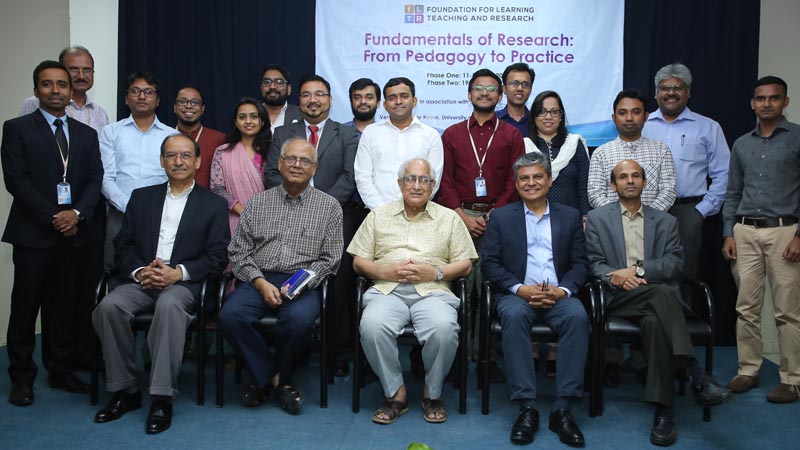Workshop on research capacity at ULAB

Eighteen aspiring academics from different public and private universities recently attended a research methodology workshop on ‘Fundamentals of Research: From Pedagogy to Practice’ was organised by the Foundation for Learning Teaching and Research in association with University of Liberal Arts Bangladesh (ULAB) held at ULAB.
Professor Dr Jahirul Haque, vice-chancellor (VC), ULAB and Professor Imran Rahman, special advisor to the ULAB BoT along with the facilitators inaugurated the workshop on 11 April, 2019. The workshop held in two phases (11-13 April) and (19-20 April). The lead facilitators of the workshop were Professor Dr Syed Saad Andaleeb, Former vice-chancellor of BRAC University and the vice-chairperson of fLTR; Professor Dr Md Golam Samdani Fakir, vice-chancellor, Green University of Bangladesh; Dr Farhat Anwar, Professor and director of IBA; education specialist Mohammad Tareque Rahman, director of CETL, ULAB.
The closing ceremony of the workshop, hosted by ULAB, was chaired by National Professor Jamilur Reza Choudhury on 20 April 2019. The chief guest Dr Manzoor Ahmed, Professor Emeritus, BRAC University and special guests were Dr Iftekharuzzaman, Executive Director, TIB; Dr Fahmida Khatun, Executive Director, CPD; and Dr HM Jahirul Haque vice-chancellor, ULAB. All the speakers stressed the importance of building research capacity in Bangladesh. They emphasized the need to allocate larger proportion (at least 6%) of GDP, in different stages of education along with making research integral to teaching.
Dr Andaleeb recalled the Prime Minister’s visionary call to do research in academia and use it to facilitate national development. He expressed his strong support for this new agenda and emphasized the need to build a special class of ‘Research Universities’ with strong graduate programmes to focus on national priorities to guide Bangladesh, not only based on GDP and economic attainments, but also on multiple social, political and cultural indexes reflecting holistic, stable and sustained development.



